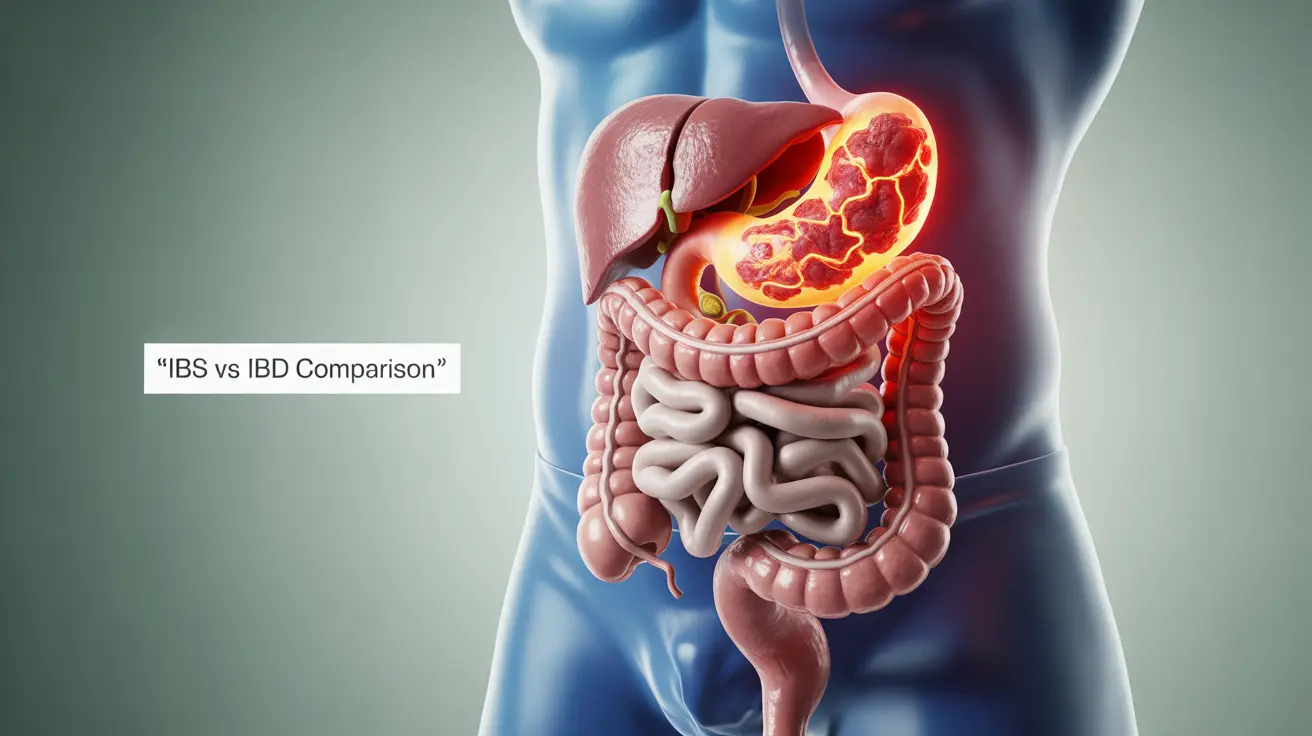If you're experiencing digestive issues like abdominal pain, bloating, and changes in bowel habits, you might wonder whether you have Irritable Bowel Syndrome (IBS) or if your symptoms point to a different condition. Understanding the distinctions between IBS and other digestive disorders is crucial for getting the right diagnosis and appropriate treatment.
This comprehensive guide will help you understand the key differences between IBS and other digestive conditions, recognize important warning signs, and know when to seek medical attention.
Key Differences Between IBS and Other Digestive Conditions
While IBS shares symptoms with several other digestive disorders, there are important distinctions that can help identify the underlying cause:
IBS vs. Inflammatory Bowel Disease (IBD)
IBS is a functional disorder affecting how your digestive system works, while IBD involves inflammation and damage to the digestive tract. Key differences include:
- No visible inflammation in IBS
- No blood in stool with typical IBS
- IBD may cause weight loss and fever
- IBD can be detected through imaging and blood tests
- IBD may require medication to control inflammation
IBS vs. Celiac Disease
Celiac disease is an autoimmune condition triggered by gluten consumption, while IBS has no specific trigger. Notable differences include:
- Celiac disease can be confirmed through blood tests and biopsy
- Strict gluten avoidance resolves celiac symptoms
- Celiac disease can cause nutrient deficiencies
- Celiac disease may affect other body systems
Warning Signs That It's Not IBS
Several "red flag" symptoms suggest a condition other than IBS:
- Unexplained weight loss
- Blood in stool
- Persistent fever
- Symptoms that wake you from sleep
- Family history of colon cancer or IBD
- Onset of symptoms after age 50
- Severe, unrelenting abdominal pain
Diagnostic Process for IBS vs. Other Conditions
Proper diagnosis typically involves several steps:
Initial Assessment
- Detailed medical history
- Physical examination
- Discussion of symptoms and triggers
- Review of family history
Common Tests to Rule Out Other Conditions
Your healthcare provider may recommend:
- Blood tests for celiac disease and inflammation markers
- Stool tests for infection or inflammation
- Colonoscopy or endoscopy if red flags are present
- CT scan or MRI in certain cases
- Food allergy or sensitivity testing
When to See a Healthcare Provider
Seek medical attention if you experience:
- New or worsening digestive symptoms
- Any red flag symptoms
- Significant impact on daily activities
- Unexplained changes in bowel habits
- Persistent symptoms despite lifestyle changes
Frequently Asked Questions
How can I tell if my symptoms are caused by IBS or something else like IBD or celiac disease?
The key distinction is the presence of red flag symptoms. IBS typically doesn't cause weight loss, bleeding, or fever. If you experience these symptoms, or if your symptoms are severe and persistent, it's likely not IBS and requires medical evaluation.
What are the red flags or warning signs that my digestive symptoms might not be IBS?
Red flags include unexplained weight loss, blood in stool, fever, nighttime symptoms, severe unrelenting pain, and new symptoms starting after age 50. These warning signs suggest a condition other than IBS and require immediate medical attention.
What tests are needed to rule out other conditions when diagnosing IBS?
Common tests include blood work, stool analysis, celiac disease testing, and sometimes imaging studies or endoscopic procedures. The specific tests needed depend on your symptoms and medical history.
How do IBS symptoms differ from those of inflammatory bowel disease (IBD) and celiac disease?
IBS symptoms don't cause inflammation or damage to the digestive tract, unlike IBD. Unlike celiac disease, IBS isn't triggered specifically by gluten and doesn't cause nutrient deficiencies. IBD and celiac disease can be confirmed through specific tests, while IBS is diagnosed primarily by ruling out other conditions.
When should I see a doctor for further evaluation if I have symptoms like abdominal pain and changes in bowel habits?
See a doctor if you experience any red flag symptoms, if your symptoms are new or worsening, or if they significantly impact your quality of life. Also seek medical attention if your symptoms persist despite lifestyle changes or if you have a family history of serious digestive conditions.




